- Home
- Gareth L. Powell
The Recollection Page 4
The Recollection Read online
Page 4
As they rattled down the runway, Kat felt her heart pump a wild surge of joy. A grin split her face, and her feet drummed excitedly on the floor. Beside her, Drake sat stiffly in his seat, still sweating, eyes closed.
As the cabin tipped upward and the wheels left the tarmac, he reached for her hand.
CHAPTER FIVE
AMETHYST
Ed Rico was painting at his easel, in front of the sash window of his apartment. The window looked down on the darkened street, and the buildings opposite: an estate agent, now closed for the night; a church repurposed as office space; an off-licence still open on the corner. Terraced houses. Sun-bleached poppies on the war memorial in the park at the end of the road. Shadowy back alleys and garages. For Sale signs like brave little flags. Black railings. Scaffolding.
When his mobile rang, he put the brush down and lifted the phone to his ear.
“Ed?” It was Alice. They hadn’t spoken since that night in her apartment, six months ago. “Ed, I’ve got an arch in my field.”
Ed looked at his watch. It was around ten-thirty. He knew Alice no longer stayed at her flat in Peckham, that she’d left London some weeks ago for Verne’s old farmhouse on the other side of High Wycombe, forty miles away.
“I can be there in an hour,” he said.
Above the rooftops, the brightly-lit towers of Canary Wharf stood like sentries. An armoured car rumbled past below, its spotlight sweeping the pavements. Helicopters criss-crossed the sky. Ed gave his brush a quick rinse in the jam jar on the windowsill and went over to the wardrobe, where he swapped his jogging bottoms for a pair of black 501 jeans. He pulled a green army surplus combat jacket over his paint-flecked black t-shirt, and laced his feet into a sturdy pair of black leather work boots.
His apartment was an anonymous two-room studio above a newsagent in Millwall, on the upper floor of a converted brown brick terrace, with a mattress on the bare floor and canvasses stacked against a chair by the door. When it was new, in the building boom at the start of the new century, it had been a desirable residence; now, two decades later, it was fucked. The paint had started to flake around the windows, light fittings dangled loose, the ceilings were cracked and stained, food cupboards no longer closed properly. It was as if the house, a Victorian brick terrace, had begun reverting to its pre-redevelopment condition, slowly reassuming its shabby natural state.
Moving to the kitchenette, he retrieved his emergency bag from the cupboard beside the fridge. It was a holdall containing a first aid kit and foil survival blanket, a couple of torches, a gas stove, some teabags, a penknife, and enough dried rations and water purification tablets to last a week. You could buy kits like it anywhere. Since the arches came, people were scared. No-one knew what to make of them.
Ed himself had been pulling double shifts at the taxi ranks. He’d tried throwing himself into his work. He’d taken fares no one else would touch. But with the radio and newspapers reporting new arches opening almost daily, nothing he did, took or drank could blot out the guilt he felt at his brother’s loss. Nor could it dampen his passion for Alice. Try as he might, it was always there, seething away.
An old semiautomatic pistol lay on top of Ed’s survival kit, wrapped in an oiled rag. He’d stolen it from the one-legged Iraq war veteran in the flat down the hall. He peeled off the rag and put the gun in the pocket of his combat jacket. Then he hefted the bag onto his shoulder and took a last look at the half-finished picture on the easel: a messy and expressionistic portrait of Alice as he remembered her on the evening of her wedding to Verne, three years ago, standing on the terrace outside the hotel.
Verne and Alice decided to get married in the autumn, almost a year after they first met, and they asked Ed to be the best man.
Towards the end of the evening, as he stepped out onto the hotel’s terrace for a breath of air, he saw her leaning on the stone balustrade, picking at her skirt.
“You look really good,” he said.
She laughed and flattened the hem down.
“I look like a meringue...” She gave him a sly look. “Hey, Ed. Have you got a spare cigarette?”
“You don’t smoke.”
“Not usually, but tonight all bets are off.”
He pulled a pack from his inside jacket pocket, tapped out a couple and lit them both. He handed one to her.
“Thanks.” She took a hit, and then sat back, trailing curls of blue smoke from her nose.
“Ah, that’s better.”
Behind her, the hotel gardens were dark. The sun had set, leaving the clouds piled like embers on the horizon, the sky purple as a bruise, the moon white as a splinter of bone. Coloured party lights had been strung in the trees and music drifted out through the open doors from the dance floor.
Ed cleared his throat.
“Look, would you like to dance?”
Alice raised her eyebrows. For a moment, she looked like she was going to make a smart remark. Then she dropped the cigarette and smoothed down the front of her wedding dress.
“Okay.”
Ed reached for her hand. He was going to take her inside, but she pulled back. She looked around at the lights and the sky and said, “Here’s fine.”
She held him tight as they started to sway. She had goose bumps on her bare arms and her hair smelled of pine-scented shampoo.
“Tell me,” she murmured. “How’s it going with that girl Verne introduced you to? What’s her name?”
Ed looked away. “Her name’s Gill. We’ve been out a couple of times.”
“And...?”
Ed stopped dancing, feeling suddenly foolish. He let go.
“Oh, she’s nice enough.” He ran a finger round the inside of his collar. “But she’s not as pretty as you.”
Alice lowered her eyes. Inside, the final song wound to its end. The house lights came up on the dance floor.
“Look, I’d better go and find Verne.” She had her hair teased into short curls, her lips and nails painted silver. Her arms were thin and cold, her eyes wide and bright.
She put a hand on his sleeve.
“But thank you,” she said.
Ed stuck out his bottom lip. “What for?”
“I know you have feelings for me, Ed. I know how hard it must have been for you today, but you’ve been great, you really have.”
He looked away.
“Thanks for the dance,” he said.
She paused a moment.
“Are you going to be okay?”
“I expect so.” He forced a smile and shooed her in. “Go!”
Verne’s old farmhouse lay at the end of a lane off the A420. When Ed arrived, he found Alice waiting in the yard in front of the house, with a shotgun in one hand and a backpack in the other.
“Nice car.” She threw the pack onto the back seat. “Where did you get it?”
“From a friend.” He’d stolen the long-wheelbase Land Rover up off the street after a taxi ride to Bethnal Green. It had been pimped out with an engine snorkel for deep water, and black wire grilles to protect the headlamps. It belonged to Grigor the Serbian butcher, and Ed had had his eye on it for weeks.
“Where’s the arch?” he said.
Wind chimes hung on the farmhouse gate. The night air smelled of cut grass, and the stars above were hard and sharp. Alice slid onto the seat beside him, with the shotgun across her knees. She pointed across the yard to a rutted dirt path leading downhill, through the fields.
“It’s down that way.”
He let the handbrake off and they started rolling.
“Is it far?”
Alice fished a band from her pocket and leaned forward, tying her bluish hair into a loose ponytail. Her jeans squeaked on the leather seat. She wore a blue zip-up fleece over a white t-shirt.
“It’s in the paddock at the end of the track, by the river.”
About a mile later, at the bottom of the valley, they bumped off onto a patch of wet ground. Caught in the Land Rover’s headlights was the arch she’d promised hi
m, four metres wide at its base and six tall.
He killed the engine.
“Does anyone else know about this?”
She shook her head. “This is all private property. The only footpath’s on the other side of the river, behind the trees.”
Ed popped the door and climbed out. It was midnight.
“Stay here.” He walked over to the arch. Looking at it made the hairs rise on the back of his neck—a frightening and exhilarating sensation that reminded him of the time he stood, as a backpacking art student in Australia, on the parapet of a single span bridge overlooking a deep river gorge, with a bungee cord lashed around his ankles.
The sides of the arch glowed like amethyst. Hesitantly, he reached out to touch the nearest. It was warm and pleasantly smooth, like candle wax. Intrigued, he walked over and laid his hand on the other, being careful not to step between them.
He found it hard to believe that it had been only seven months since the appearance of the Chancery Lane arch, and Verne’s disappearance. Now at least a dozen lay scattered around the country, more than a hundred worldwide.
“How long’s this one been here?” he said.
Alice stood holding the shotgun in one hand, a digital camera in the other.
“About two hours. I called you as soon as I found it.” She raised the camera and fired off half a dozen quick shots, getting him and the arch. Then she shivered, as if cold.
Ed walked back to the Land Rover and climbed into the driver’s seat. His fingers drummed on the wheel as he nerved himself to carry out his plan.
Alice opened the passenger side door and clambered in beside him. “What do you think?” she said. She seemed better than she had the last time he’d seen her. Calmer. More focused. The grief was still there, every bit as strong as before, but now better hidden.
Ed stopped drumming. He peered through the windshield at the arch, standing in the light from the car, in a field that smelled of dry grass and cow shit.
“I’m going to go through,” he said. The authorities had the other arches blocked off. If he passed up this chance, he knew he’d never get close enough to try again.
Alice frowned. Her knuckles were pale on the shotgun stock.
“Are you sure?”
Ed swallowed. All his instincts were telling him to turn the car around and make a run for it. Instead, he slid his hand into his combat jacket and pulled out the gun, and a St Christopher medal he’d pocketed on the way out of the flat: an old birthday present from his missing brother.
“I’ve got to find him,” he said, laying the medal on the dashboard, hoping he sounded a lot more decisive than he felt.
Alice bit her lip. She reached over and touched his arm.
“Then I’m coming with you.”
He squeezed her hand.
“Are you sure?”
She pulled away, eyes on the gun. “I’ve already lost my husband. You’re all I’ve got left; I don’t want to lose you as well.”
Ahead, the moon cast long dark shadows through the trees on the far riverbank. Moths flickered in the headlight beams. Ed settled himself into the driver’s seat, and slipped the pistol into the glove box. He wiped the sweat from his palms on the hem of his paint-splattered black t-shirt. Then he leant forward, squeezing the hard leather steering wheel.
“Okay, then.”
He turned the ignition and eased the Land Rover forward, over the uneven ground, keeping a firm grip on the wheel and the toe of his boot light on the accelerator pedal. The arch loomed up before them, easily tall and wide enough to swallow the Land Rover.
“Here we go,” he said. He took a deep, shuddering breath, and pumped the gas. They slithered forward, the wheels slipping on the wet grass, kicking up mud. The wing mirror on the passenger side hit the inside edge of the arch. There was a white flash, and an instant of shocking cold—
CHAPTER SIX
ARTIFICIAL SUNS
The shuttle flight to the Ameline’s parking orbit took an hour. Kat spent most of the time in her acceleration couch, working via her implant on the electronic forms needed to clear the ship for departure. There were so many—flight plans, health and safety certifications, maintenance updates, passenger manifests—that they took her full attention until the shuttle’s pilot announced they were on final approach to the Ameline’s rear airlock. She rarely had the chance to see her ship from the outside, so she leant across Tony Drake’s legs and pressed her nose to the porthole.
The Ameline was a snub-nosed wedge of black tungsten alloy and smart carbon composite, five metres across at the bow, flaring back to thirty at the stern. Long ago, someone had painted the ship in the blue and red livery of the Abdulov trading family. Black and yellow stencils marked out intake valves, air brakes and emergency hatches. Sensor pods and lateral thrusters stuck out like horns, and at the back, the rear airlock sat snug between the black exhausts of the main engines.
By the time Kat popped the lock and stepped into the Ameline’s musty interior, she had the paperwork complete and a clear launch window approved. She led Drake and the Acolyte through the cold, echoing cargo bay to the common area, which comprised a cramped lounge with a circular table, and a galley with doors leading off to individual staterooms. She waved at a pair of threadbare couches.
“Sit down gentlemen, and make yourselves comfortable.”
She showed Drake how to fasten the safety straps on his couch. Then she jerked a thumb at a hatch in the forward wall.
“If you need anything, I’ll be through there, on the flight deck.”
She ducked through the hatch into an antechamber, where she removed her coat and changed her grubby fatigues for an elasticised, skin-tight ship suit. Already, she could feel the Ameline’s enthusiasm for the coming flight. Through her implant, she could hear its silicon mind chattering at the edge of her awareness, running course calculations and internal status checks.
Dressed, she climbed the ladder up to the flight deck, a grey-walled cave at the front of the ship, illuminated by banks of softly glowing computer displays. Sliding her legs beneath the main console, she settled herself into the pilot’s seat.
She could see the curve of Tiers Cross through the forward windows, its snowfields blindingly bright with the reflected light of its orbiting, artificial suns. She took a moment to savour the view before buckling up, thinking of all the cold, lonely evenings she’d spent standing on its frozen streets looking up, anticipating this moment.
When she was ready, she hooked her neural implant into the ship’s sensorium and a head-up display appeared, superimposed across the vision in her right eye. Life support connectors snaked into the sockets sewn into the chest and thighs of her ship suit. The peppery smell of raw space filled her nostrils as her body interpreted the incoming data from the ship’s sensors, converting it into recognisable human sensations. Her skin prickled all over and, deep in her gut, she could feel power building in the fusion reactor. She was linked to the ship and it pulled at her like an eager puppy straining the leash.
> Where are we going?
It showed her a stylised, three dimensional map of local space, covering a sphere a dozen light years in radius.
Kat smiled.
“It’s good to be back,” she said.
She blinked up a cursor and used it to click on the icon representing Strauli Quay. Seven light years away, with few natural resources and situated at the intersection of three trade routes, the planet was an important crossroads in interstellar culture, a collision of ideas and fashions from a hundred worlds, its wealth and reputation sustained by the rivers of commerce flowing through its orbital docks. And although no-one there had seen her in decades, it was also her home.
She thought of her parents, living and working in the sunny coastal villas and courtyards of the Abdulov compound. In her head, she could almost smell the jasmine in the gardens and hear the snap and flap of boat sails on the afternoon tide.
> Set course for Strauli Quay?
“Yes.”
> You got it.
She felt the old ship shiver as the fusion thrusters fired, pushing it up and out of orbit, seeking the emptiness of interstellar space. Tiers Cross fell away from the window, to be briefly replaced by the sparkling jewels of the Bubble Belt.
> Message coming in.
Above the window, one of the overhead displays cleared to reveal the worried face of the family representative, Ezra.
“Captain Abdulov? Are you under way?”
“We’re just breaking orbit. Why, what’s the matter?”
The young man flushed. “It’s Captain Luciano. His ship jumps for Strauli in five minutes.”
“Victor’s ahead of us?” Kat cursed under her breath. It was illegal to activate jump engines within a hundred planetary diameters of the surface—a distance that would take her more than an hour to reach at maximum thrust.
“Yes, I’m afraid we failed in our attempt to delay him.”
“Did you put in the complaint?”
“I did, but the local police have shown considerable reluctance to interfere in what they call ‘a dispute between traders.’ Personally, I suspect bribery.”
Kat balled her fists. She’d given up her home and family for Victor Luciano, only to have that sacrifice thrown back in her face when he left her. She couldn’t let him beat her to Djatt, not now she stood to get back everything she’d lost.
A matter of honour, Ezra had called it.
She took a deep breath.
“Okay,” she said, “here’s what’s going to happen. Ezra, you need to get on the line to traffic control. Tell them I’ve got an emergency on board. I don’t care what, make something up.”
“An emergency?”
“I don’t know. A reactor leak, maybe. Something that means I have to activate my jump engines right now.”
“You can’t do that.”
“At the same time, I’m going to open up the fusion motors so I’ll have enough residual velocity following the jump to overtake Victor before he reaches the Quay.”

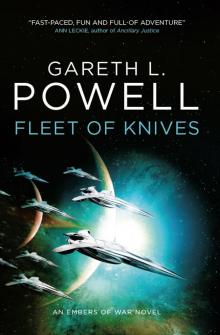 Fleet of Knives
Fleet of Knives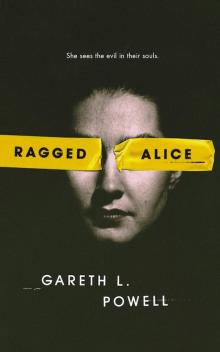 Ragged Alice
Ragged Alice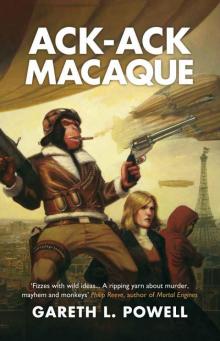 Ack-Ack Macaque
Ack-Ack Macaque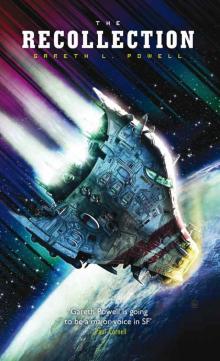 The Recollection
The Recollection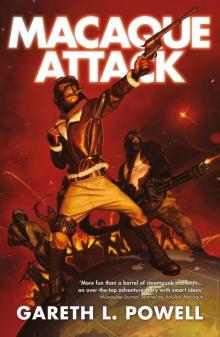 Macaque Attack!
Macaque Attack! Embers of War
Embers of War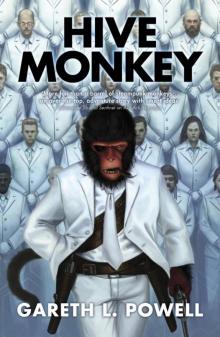 Hive Monkey
Hive Monkey